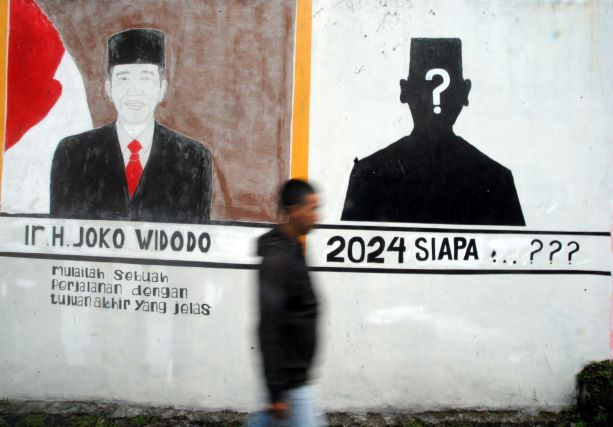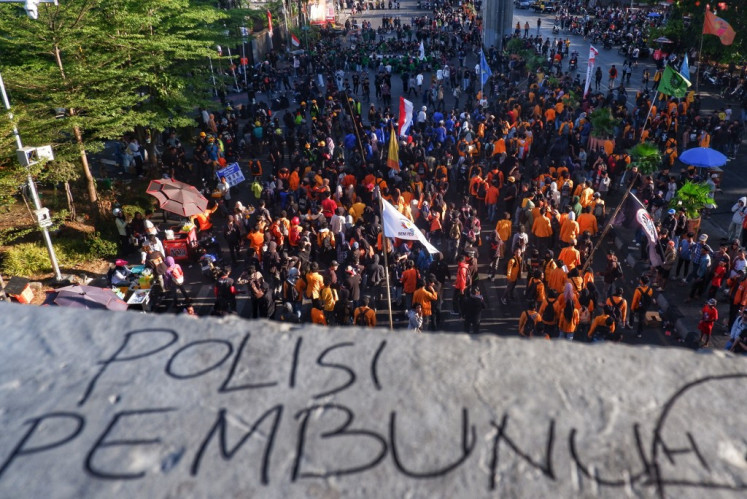Popular Reads
Top Results
Can't find what you're looking for?
View all search resultsPopular Reads
Top Results
Can't find what you're looking for?
View all search resultsNomination anomalies limit choice for voters: Observers
Change text size
Gift Premium Articles
to Anyone
T
he Association for Elections and Democracy (Perludem) watchdog has raised concerns that political parties could exploit quirks in the country’s presidential nomination system alongside the coattail effect to advance their interests at the cost of real voter choice.
“Voter behavior in concurrent [legislative and presidential] elections is such that they’ll vote for the parties that have nominated their preferred presidential candidate," said Perludem's Titi Anggraini in a public discussion held on Sunday.
She made the point in a discussion held by the Indonesian Public Opinion Research and Discussion Group (KedaiKOPI).
The strength of this coattail effect – wherein a party benefits in legislative and local elections by fielding a popular presidential candidate – is evident in a poll released by Saiful Mujani Research and Consulting (SMRC) last week. It used the Golkar Party and Central Java Governor Ganjar Pranowo of the Indonesian Democratic Party of Struggle (PDI-P) as a case study.
“If Golkar were to nominate Ganjar [for the 2024 presidential election], it would result in a pretty significant boost, from 11 percent to 17 percent of votes [for the Golkar Party in the legislature]," SMRC founder Saiful Mujani said.
The hypothetical nomination also resulted in a significant loss of votes for the PDI-P, dropping from 25 percent to 18 percent of the popular vote in the legislature.
“In polls, the PDI-P has consistently ranked first, but it turns out that the party’s dominance is partly because of Ganjar, and he could potentially lure voters away from the PDI-P if he were to jump ship," Saiful said.
Speaking to The Jakarta Post, former General Elections Commission (KPU) member Hadar Nafis Gumay noted that narratives created by political parties had contributed to the potential for voter choice to be sidelined.
“To maintain a smooth government, the parties have a consensus that the president must be backed by the nominating parties [in the House of Representatives]," said Hadar, who is also cofounder of the Network for Democracy and Electoral Integrity (Netgrit), on Tuesday.
Both Titi and Hadar agreed that these issues were symptoms of larger anomalies in Indonesia’s presidential system.
Parliamentary system?
Under the current presidential threshold, a party or a coalition of parties must hold at least 20 percent of the seats in the House of Representatives or have secured 25 percent of the popular vote in the previous election to field a presidential candidate. This steep requirement, Hadar said, showed that Indonesia’s electoral system was closer to a parliamentary system.
“Yes, the public still casts votes on election day, but everything up until that point is at the discretion of the [political parties]," said Hadar.
That the public had no say in who would eventually be listed as the candidates, he added, showed just how much control the political parties had over the election process at the cost of public will.
The current system, Titi said, also induced the parties to be more pragmatic, preferring to nominate candidates that could help them on election day.
“If none of their cadres turns out to be promising, they can simply pick an external candidate, which betrays the concept of the political party as a cadre organization," she said.
KedaiKOPI founder Hendri Satrio said this pragmatism “degrades the parties from being parties of ideology into mere vote chasers” on election day.
The NasDem Party, for one, went outside of its own ranks to nominate former Jakarta governor Anies Baswedan in October.
Despite not being affiliated with any political parties, Anies has consistently ranked as one of the most electable presidential candidates, alongside Ganjar and Defense Minister Prabowo Subianto of the Gerindra Party, in various surveys. But Anies’ future still hangs in the balance, as NasDem must build a coalition with other parties to meet the threshold to field a presidential candidate.
Presidential threshold
As long as Indonesia held on to that representation threshold, Hadar said, future elections would run into the same problems.
“With such steep requirements, there will probably be only two pairs of candidates. The parties keep saying that one round of elections is ideal, but ideal for whom, exactly?” he said.
Titi agreed and encouraged the public to look to Brazil, which held an election in October.
“Brazil also held a concurrent election with two [rounds of voting], but there were 11 candidates in total and four of them were women," she said.










